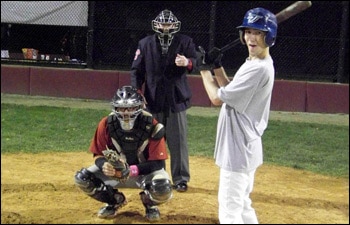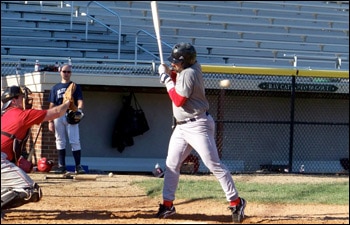I didn’t want to do it again. I could have given you a hundred reasons why. It’s hard to raise money from a charity baseball game. The novelty of playing a marathon game wears off. It’s tiring to play two straight days of baseball. But people kept pushing to play. And so we did it. Again.
The 9th annual 100 Innings of Baseball Spectacular was played on October 20 and 21. For those unfamiliar with the game, it was born in 2004 as the world’s longest baseball game, and founded by members of the Boston Men’s Baseball League with the arrival of Curt Schilling to the Boston Red Sox as a fundraiser for Curt’s Pitch for ALS and the fight against Lou Gehrig’s disease. The game has continued ever since, raising money for ALS causes, including The ALS Association, the Walter Bentson Scholarship Fund, and this year, The Angel Fund. The game has raised more than $527,000 to date.


Since the beginning, I had been one of the event organizers. In the game’s early years, the hard part was the months of planning. You had to find a field willing to keep lights on overnight, arrange for umpires to work non-stop for 30+ straight hours, and obtain sponsors like vitaminwater to keep the players hydrated, and Reebok to provide them with gear as incentive to play more innings and raise more funds. Over the years, this planning has become the easy part, as the same contributors look to get involved each year. What use to require proposals and meetings can now be taken care of with a single email. The challenge these days are getting players to play 100 innings and also raise money. Yet, every year, we seem to pull it off.
The evening of October 19 was a disaster. It rained quite hard, and thunder shook my house at 3AM to the point that my 9-yo son came running into my room to spend the remainder of the night. There was no way we were playing the following day. Even if the rain stopped, the field would be unplayable for a 9AM start. I was sure of it.
I arrived at Adams Field in Quincy, MA at 8AM, and the grounds crew was already there. In fact, they had been there since 5AM prepping the field. And the game started at 9:35AM, just a touch late. At game time, the field was in the best shape of any field I’ve seen all year.
Apparently the weather scared people away, and the game started with just 22 players – not a deep roster for a game slated for two straight days. But the game got underway: Team Walter versus Team Bentson – named for Walter Bentson, this year’s event leader and also the umpire chief, who happens to be living with ALS himself.
I had not missed an inning in the Game’s prior eight years, and was planning on going the distance this year, too.
Ryan Bere of the Blue Jays from the Boston MABL was the starting pitcher for Team Bentson, my team. He lasted 20 innings before he got the hook, allowing 12 runs, most of which he swears were unearned. Bere had wanted to beat the record of 30 straight innings set the year before by Brent Campbell, but Grady Campion of Cannon Club from the Park League had arrived and it was time for Ryan to put the arm on ice.
While new players continued to show up throughout the day, it seemed as if players were departing even faster. The remaining players were struggling to keep it going, when around dusk, the Yawkey League’s championship team, Somerville Alibrandis, showed up and added some pop to the Team Bentson lineup. Four-time Yawkey MVP, Marc DesRoches, pitched for a while, and he and the rest of the Alibrandis helped the squad bump up the score. We piled on a 20-run lead.
By the 39th inning, I could barely walk. Just from getting from the dugout to my position in the outfield, I had run several miles, and that was without really even doing anything. Thinking of what those with ALS battle through, I sucked it up and kept on going.
Midnight came, and Walter Bentson came out of retirement again to umpire his now traditional half inning. Mike Pollak who used to manage a team in Boston, but now lives in New York, gave an appropriate midnight speech midnight. By the 46th inning, our lead had fallen to 51-37.
In the wee hours of the morning, the game was dragging. Players continued drop off, take naps in cars, or fall asleep along the baseline. Jimmy Casale, a player from Framingham, was asleep under a blanket beyond first base when he got hit in the head with an overthrow. He didn’t even move. He was lights out.
By the time the sun broke the horizon, players were zombies. Around 9AM on Sunday morning, the Lexington Blue Sox from the Intercity League arrived. One of their teammates, Pete Frates, had been diagnosed with ALS just about a year previously, and the Blue Sox were there to support him. Pete himself was at the game from the 77th inning until the 92nd. In fact, the only homerun of the game was hit by his teammate, and former Intercity League MVP, Dan Graham.
At around 10:30AM on Sunday morning, Red Sox legend Lou Merloni showed up to play. He played shortstop for Team Walter, and in his first at bat, was greeted by an inside pitch by the Blue Sox’ Matt Keough that plunked him in the ribs. Yet with Merloni on the roster, Team Walter overcame their deficit, and ultimately won the game 90-80.
Sal Mirabella plays for Lexington and spoke about his team’s participation in the game.
“It’s very difficult to see Pete Frates now knowing that one and a half years ago he could throw a strike on a clothes line from centerfield to home plate. It’s so unfortunate, but he stays positive. And we’ll do whatever we can to support him.”
I asked him about the game itself.
“It was one of the best experiences of my amateur baseball career. I wouldn’t have met half the people there if not for this game. And I can tell you this, you’ll have us back here, year after year.”
And so the game that never ends keeps on going. Nine frames wasn’t enough. Extra innings are coming. I don’t know how we keep it going.
Brett Rudy is a trailblazer in the world of baseball. As the founder of Baseball Is My Life and co-founder of Charity Hop Sports Marketing, he’s dedicated to elevating the sport and supporting the athletes who play it. With a passion for making a difference, Brett has created successful philanthropic initiatives like Charity Wines and 100 Innings of Baseball for ALS. He’s also the mastermind behind the Corked Bat Collection, Cooperstown Classic at the Baseball Hall of Fame, and Winterball for Toys for Tots. When he’s not working to improve the game, Brett can be found playing outfield in the Boston Metro Baseball League, living and breathing the sport he loves.